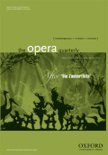
OPERA QUARTERLY
Scope & Guideline
Unveiling the Rich Tapestry of Opera Studies
Introduction
Aims and Scopes
- Interdisciplinary Connections:
The journal explores the relationship between opera and other art forms, particularly film, highlighting how these mediums influence and adapt to each other. - Cultural and Historical Contextualization:
OPERA QUARTERLY examines opera within its cultural and historical frameworks, addressing issues such as race, migration, and identity, and how these themes manifest in operatic works. - Technological and Digital Engagement:
The journal investigates the impact of technology and digital platforms on opera, including streaming performances and the evolution of audience engagement in the digital age. - Critical Reception and Activism:
It delves into the critical reception of operatic works and the role of opera in activism, focusing on how operas respond to contemporary social issues. - Global Perspectives:
The journal emphasizes a global and transnational perspective on opera, examining how Italian opera and other forms are reimagined and contextualized in diverse cultural settings.
Trending and Emerging
- Adaptation of Film to Opera:
A growing interest in the adaptation process between film and opera is evident, exploring how narrative and artistic elements transform across these mediums. - Operatic Activism and Social Issues:
There is a notable increase in discussions surrounding operatic works that engage with social justice, race, and identity politics, reflecting a broader cultural awareness. - Digital and Multimedia Opera:
The exploration of opera in digital formats and multimedia contexts is on the rise, examining how technology reshapes operatic performance and audience interaction. - Global and Transnational Perspectives on Italian Opera:
Emerging themes include a critical reevaluation of Italian opera through a global lens, considering its impact and reinterpretation within various cultural frameworks. - Voice and Identity:
Research focusing on the relationship between voice, race, and identity in opera is becoming increasingly prominent, addressing how these elements intersect in contemporary operatic narratives.
Declining or Waning
- Traditional Operatic Forms:
There has been a noticeable decrease in research focused solely on traditional operatic forms and their historical practices, as the journal shifts toward more contemporary and interdisciplinary approaches. - Static Historical Analysis:
Papers that primarily provide static historical analyses of opera without connecting to current cultural or societal issues appear to be waning, as the journal emphasizes relevance and contemporary discourse. - Local Narratives:
There is a reduction in studies concentrating exclusively on localized operatic narratives, as the journal increasingly embraces global and transnational themes that reflect broader societal contexts.
Similar Journals

OPERA NEWS
Celebrating the Art of Opera, One Note at a Time.OPERA NEWS is a premier publication dedicated to the vibrant world of opera, published by the renowned Metropolitan Opera Guild Inc. This journal, with an ISSN of 0030-3607 and E-ISSN of 1938-1506, serves as an essential resource for opera enthusiasts, researchers, and professionals alike, offering insightful articles, interviews, and critical reviews that delve into the rich tapestry of operatic performance, history, and artistry. Although the journal's coverage in Scopus was discontinued in 2009, OPERA NEWS continues to be influential in the opera community, fostering a greater appreciation and understanding of this magnificent art form. While currently not Open Access, it remains widely available to institutions and individuals passionate about opera, providing an invaluable platform for knowledge sharing and community engagement in a field that transcends cultural boundaries.

Critical Studies in Television
Engaging with the Critical Dimensions of TelevisionCritical Studies in Television is a leading academic journal published by SAGE Publications Ltd, dedicated to exploring the intricate dimensions of television within the fields of Communication and Cultural Studies. Since its inception, this journal has become an essential resource for researchers, professionals, and students alike, particularly as it navigates the evolving landscape of television studies from 2014 to 2024. With an impressive impact factor, the journal achieved notable rankings in 2023: it is positioned in the Q2 quartile for Communications and the Q1 quartile for Cultural Studies. Recognized by Scopus with a rank of #160 in Cultural Studies and #193 in Communication, it reflects its growing influence and relevance in these academic arenas. While currently not available through an Open Access model, readers are encouraged to engage with its diverse and critical contributions that foster a deep understanding of television’s role in contemporary culture.
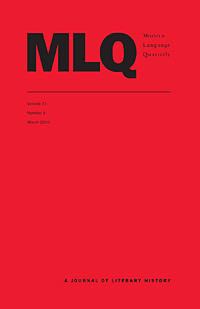
MODERN LANGUAGE QUARTERLY
Illuminating the Intersection of Language and Society.MODERN LANGUAGE QUARTERLY, published by DUKE UNIVERSITY PRESS, stands as a premier journal in the field of Literature and Literary Theory, recognized for its intellectual rigor and scholarly contributions. With an impressive Scopus ranking of #156 out of 1106 in its category, the journal showcases an 85th percentile standing, indicating its significant impact within the academic community. The journal, with ISSN 0026-7929, focuses on critical analysis, literary theory, and the intersection of language and culture, making it an essential resource for researchers, professionals, and graduate students alike. As it converges from 1996 to 2024, MODERN LANGUAGE QUARTERLY continues to uphold its tradition of excellence in literary scholarship, contributing to the advancement of knowledge and fostering a deeper understanding of literature's role in society. With its Q1 ranking in 2023, this journal represents the forefront of literary studies, providing a vibrant forum for the exchange of ideas and innovative research in the humanities.

NEOHELICON
Bridging Arts and Humanities with Social InquiryNEOHELICON, published by Springer, is a prominent journal dedicated to the interdisciplinary studies within the field of Arts and Humanities, as well as Law and Social Sciences. Since its inception in 1973, the journal has served as a vital platform for scholars and researchers, showcasing original research, critical analyses, and scholarly debates that contribute significantly to literature and literary theory. With a current impact factor reflecting its influence in academia, NEOHELICON maintains an impressive ranking within Scopus, standing in the 66th percentile for Literature and Literary Theory and achieving Q3 classification across various academic categories in 2023. The journal, published in the Netherlands, operates without an open access option, positioning itself as a critical resource in the advancement of knowledge across these diverse fields. Its convergence of years from 2002 to present highlights a dedicated commitment to ongoing discourse, making NEOHELICON an essential resource for researchers, professionals, and students alike seeking to deepen their understanding of these dynamic disciplines.
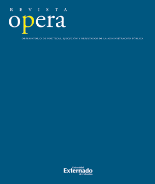
Opera-Colombia
Exploring the Harmonies of Colombian OperaOpera-Colombia is a distinguished academic journal published by UNIV EXTERNADO COLOMBIA, DEPT PUBLICACIONES, that has been serving the scholarly community since its inception in 2001 as an Open Access platform. With its ISSN 1657-8651 and E-ISSN 2346-2159, the journal stands out as a vital resource for researchers, professionals, and students in the fields of performing arts, musicology, and cultural studies. Based in Bogotá, Colombia, it aims to foster the dissemination of innovative research and critical discourse within the sphere of Colombian opera and beyond. As a journal committed to accessibility, it ensures that its wide-ranging articles are freely available to promote knowledge and engagement worldwide, reinforcing its importance in the contemporary academic landscape.

AVANT SCENE OPERA
Diving Deep into Opera’s Cultural ResonanceAVANT SCENE OPERA is a distinguished journal that delves into the rich world of opera, fostering a deeper understanding of this dynamic art form. Published by AVANT-SCENE OPERA in Paris, France, this journal serves as a critical resource for scholars, practitioners, and enthusiasts alike, making significant contributions to the discourse surrounding opera through in-depth analyses, reviews, and interviews with leading figures in the field. While it currently operates under a subscription model, its commitment to advancing opera scholarship ensures that cutting-edge research and insights are made accessible to a global audience. As a vital platform for artistic and scholarly inquiry, AVANT SCENE OPERA aspires to elevate the profile of opera, exploring its historical, cultural, and contemporary significance within the performing arts.

UNIVERSITY OF TORONTO QUARTERLY
Advancing scholarship in the Arts and Humanities.The University of Toronto Quarterly, published by University of Toronto Press Inc., is a prestigious journal dedicated to advancing scholarship in the field of Arts and Humanities. Founded in Canada, this esteemed publication plays a critical role in fostering intellectual discourse and disseminating groundbreaking research. With an impact factor that reflects its significance within the academic community, the journal is classified in the second quartile (Q2) of Arts and Humanities as of 2023 and holds a respectable Scopus rank of 73 out of 173, placing it within the 58th percentile. Although the journal is not open access, it provides a rich repository of interdisciplinary perspectives, featuring articles that engage with historical, literary, and cultural studies while exploring contemporary issues. The University of Toronto Quarterly aims to connect researchers, professionals, and students alike, solidifying its position as a cornerstone for innovative thought and scholarly research in the humanities. With its convergence of ideas and commitment to academic excellence, this journal will continue to shape the future of research up to 2024 and beyond.
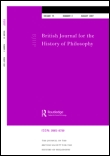
British Journal for the History of Philosophy
Connecting Historical Philosophies to Contemporary DiscourseThe British Journal for the History of Philosophy, published by ROUTLEDGE JOURNALS, TAYLOR & FRANCIS LTD, is a leading academic journal dedicated to the exploration and critical examination of historical philosophies and their implications. Founded in 1993 and operating through 2024, this quarterly publication holds a prestigious status, being ranked Q1 in Philosophy with a Scopus rank of 188 out of 806, placing it in the 76th percentile within the arts and humanities domain. The journal is unique in its commitment to showcasing interdisciplinary research, catering to scholars, professionals, and students interested in philosophical history's complexities and developments. Although it does not currently offer Open Access options, it remains an essential resource for contemporary debates and historical insights in philosophy, contributing to the wider academic discourse on ethical, epistemological, and metaphysical inquiries.
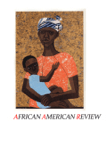
AFRICAN AMERICAN REVIEW
Exploring the Rich Tapestry of African American VoicesAFRICAN AMERICAN REVIEW, published by the Johns Hopkins University Press, stands as a pivotal journal since its inception, dedicated to exploring the multifaceted aspects of African American literature, culture, and artistic expression. With an ISSN of 1062-4783 and an E-ISSN of 1945-6182, this journal provides a critical platform that delves into the rich tapestry of African American experiences, bridging gaps across literary, cultural, and visual arts disciplines. Its latest impact metrics position it in esteemed quartiles, achieving Q2 rank in both Literature and Literary Theory and Visual Arts and Performing Arts, alongside a strong presence in Cultural Studies with a Q3 classification. The journal’s commitment to high-quality scholarship is reflected in its Scopus rankings, drawing attention from researchers and scholars invested in cultural narratives and historical contexts. Although not currently open access, the journal's comprehensive analyses contribute significantly to discussions in academia and beyond, making it an essential resource for researchers, educators, and students alike looking to deepen their understanding of African American contributions to the arts and humanities.
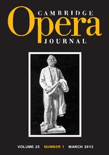
Cambridge Opera Journal
Celebrating the Intersection of Music and Visual ArtsCambridge Opera Journal, a distinguished publication from Cambridge University Press, serves as a vital platform for scholarly discourse in the fields of Music and Visual Arts, particularly focusing on the intricate world of opera. With an ISSN of 0954-5867 and an E-ISSN of 1474-0621, this journal is committed to exploring the aesthetic, cultural, and historical contexts of opera, making it invaluable for researchers, professionals, and students alike. Although it operates under a non-open access model, its contributions have significant academic merit, reflected in its placement within the Q3 category for the 2023 ranking in both Music and Visual Arts and Performing Arts. Since its inception in 1989, the journal has continually sought to foster innovative dialogue and critical analysis, establishing itself as an essential resource within the scholarly community. With ongoing publication through 2024, the Cambridge Opera Journal remains dedicated to enhancing the understanding and appreciation of opera as an art form, ensuring its relevance in current and future academic conversations.